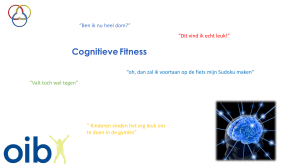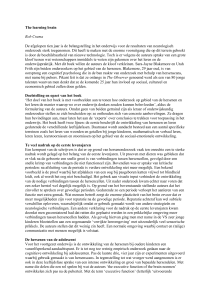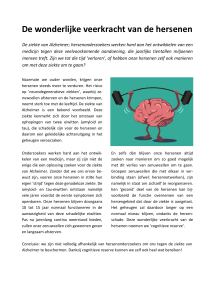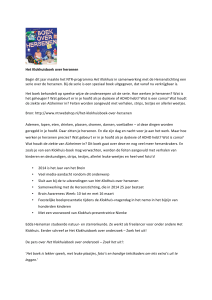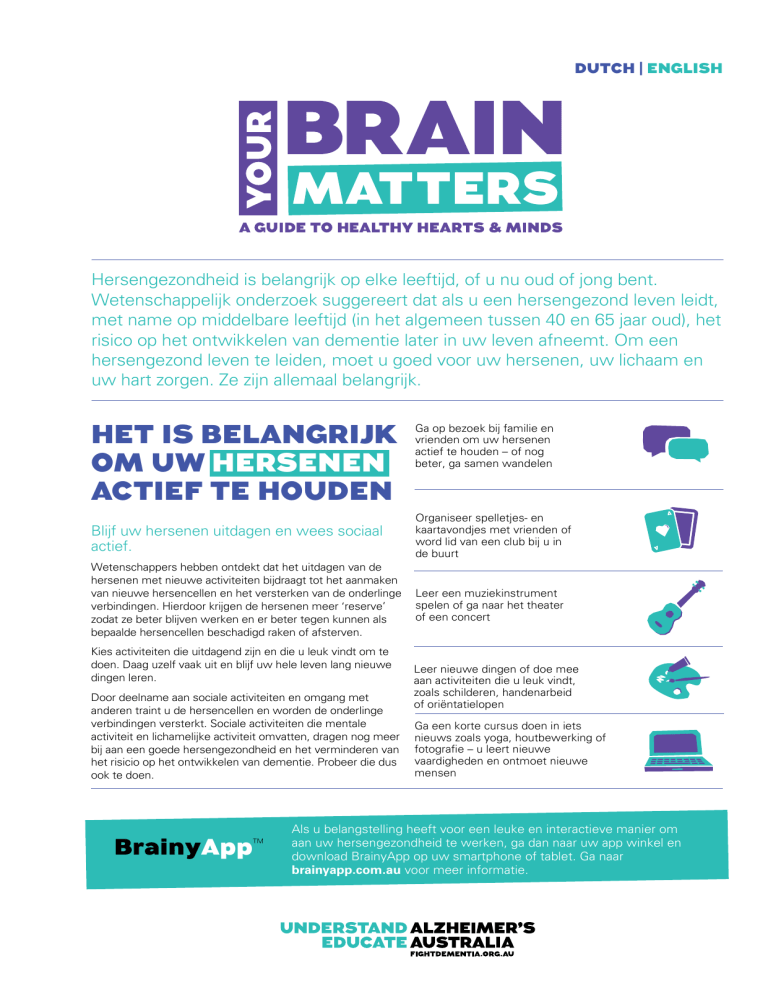
DUTCH | english
Hersengezondheid is belangrijk op elke leeftijd, of u nu oud of jong bent.
Wetenschappelijk onderzoek suggereert dat als u een hersengezond leven leidt,
met name op middelbare leeftijd (in het algemeen tussen 40 en 65 jaar oud), het
risico op het ontwikkelen van dementie later in uw leven afneemt. Om een
hersengezond leven te leiden, moet u goed voor uw hersenen, uw lichaam en
uw hart zorgen. Ze zijn allemaal belangrijk.
Het is belangrijk
om uw hersenen
actief te houden
Blijf uw hersenen uitdagen en wees sociaal
actief.
Wetenschappers hebben ontdekt dat het uitdagen van de
hersenen met nieuwe activiteiten bijdraagt tot het aanmaken
van nieuwe hersencellen en het versterken van de onderlinge
verbindingen. Hierdoor krijgen de hersenen meer ‘reserve’
zodat ze beter blijven werken en er beter tegen kunnen als
bepaalde hersencellen beschadigd raken of afsterven.
Kies activiteiten die uitdagend zijn en die u leuk vindt om te
doen. Daag uzelf vaak uit en blijf uw hele leven lang nieuwe
dingen leren.
Door deelname aan sociale activiteiten en omgang met
anderen traint u de hersencellen en worden de onderlinge
verbindingen versterkt. Sociale activiteiten die mentale
activiteit en lichamelijke activiteit omvatten, dragen nog meer
bij aan een goede hersengezondheid en het verminderen van
het risicio op het ontwikkelen van dementie. Probeer die dus
ook te doen.
BrainyApp
TM
Ga op bezoek bij familie en
vrienden om uw hersenen
actief te houden – of nog
beter, ga samen wandelen
Organiseer spelletjes- en
kaartavondjes met vrienden of
word lid van een club bij u in
de buurt
Leer een muziekinstrument
spelen of ga naar het theater
of een concert
Leer nieuwe dingen of doe mee
aan activiteiten die u leuk vindt,
zoals schilderen, handenarbeid
of oriëntatielopen
Ga een korte cursus doen in iets
nieuws zoals yoga, houtbewerking of
fotografie – u leert nieuwe
vaardigheden en ontmoet nieuwe
mensen
Als u belangstelling heeft voor een leuke en interactieve manier om
aan uw hersengezondheid te werken, ga dan naar uw app winkel en
download BrainyApp op uw smartphone of tablet. Ga naar
brainyapp.com.au voor meer informatie.
DUTCH | english
Het is belangrijk
om fit en
gezond te zijn
Eet gezond en doe regelmatig aan
lichaamsbeweging. Uw hersenen hebben
een verscheidenheid aan voedingsstoffen,
vloeistoffen en energie nodig om goed te
werken.
Vermijd een grote hoeveelheid voedsel met een hoog
gehalte aan verzadigd vet (boter, gefrituurd eten, verwerkte
vleeswaren, cakes, gebakjes en koekjes). Kies een variëteit
aan voedsel, waaronder groente, fruit, volkorenbrood, noten
en zuivelproducten met een laag vetgehalte. Eet vis, mager
vlees en kook met mono-onverzadigde of poly-onverzadigde
oliesoorten (canola-, olijf-, zonnebloem- en sojaboonolie).
Als u alcohol drinkt, dient u slechts met mate te drinken, dat
wil zeggen niet meer dan twee standaarddrankjes per dag.
Regelmatige lichamelijke activiteit is goed voor uw
hersengezondheid. Het bevordert bloedstroom en
zuurstoftoevoer naar de hersenen.
Leer dansen – het is een
geweldige
lichaamsbeweging die uw
hersenen stimuleert
Eet een verscheidenheid aan
voedsel uit de verschillende
voedselgroepen en gebruik
minder verzadigde vetten
Gebruik in uw dieet omega 3
vetzuren uit vis en andere
bronnen, zoals walnoten
Neem twee keer per dag
fruit – maak een fruitsalade,
neem fruit bij het ontbijt
Eet dagelijks vijf porties
groente
Probeer dagelijks tenminste 30 minuten aan gematigde
lichaamsbeweging te doen. Kies activiteiten die u leuk vindt,
zoals wandelen, zwemmen, dansen, tai chi of word lid van
een sportgroep.
Zorg dat u minstens 30 minuten
lichaamsbeweging in uw
normale dagelijkse routine
opneemt
Het is belangrijk
om goed voor uw
hart te zorgen
Vraag uw
gezondheidszorger advies
over gewichtsverlies
Laat uw bloeddruk regelmatig
controleren
Wat goed is voor het hart is goed voor de
hersenen.
Onderzoek toont aan dat suikerziekte, hoog cholesterol of
hoge bloeddruk die niet doeltreffend behandeld worden,
de bloedvaten in de hersenen kunnen beschadigen
en de hersenfunctie en denkvaardigheden kunnen
beïnvloeden.
Wat goed is voor het hart is ook goed voor
de hersenen – vraag de dokter uw
bloeddruk, cholesterol, bloedsuiker en
gewicht regelmatig te controleren
Het is belangrijk om uw gezondheid regelmatig te laten
controleren en het advies van uw dokter of
gezondheidszorger op te volgen. Houd uw bloeddruk,
cholesterol, bloedsuiker en lichaamsgewicht op een niveau
dat voor u gezond is, en volg het behandelingsadvies.
Als u 45+ bent dient uw hart
regelmatig gecontroleerd te worden
evenals het risico op een beroerte
Er is bewijs dat roken het risico op dementie verhoogt.
Om uw hersenen gezond te houden, dient u roken te
vermijden.
Vermijd roken – praat met uw
gezondheidszorger of bel de
Quitline op 13 78 48 voor hulp met
stoppen
Ga voor meer informatie over een hersengezond leven leiden naar Alzheimer Australia’s yourbrainmatters.org.au
Of bel de Nationale Dementie Hulplijn op 1800 100 500
Als u een tolk nodig heeft kunt u de de Telefonische Tolkdienst bellen op 131 450
Deze publicatie verstrekt alleen een algemene samenvatting over het betreffende onderwerp. Mensen dienen
deskundig advies over hun specifieke geval in te winnen. Alzheimer’s Australia is niet aansprakelijk voor fouten
of weglatingen in deze publicatie.
Alzheimer’s Australia’s Your Brain Matters programma wordt ondersteund door een subsidie van de Australische
overheid uit het Chronic Disease Prevention and Service Improvement Fund.
© 2012 Alzheimer’s Australia
Being brain healthy is important at any age, whether you’re young or old.
Scientific research suggests that living a brain healthy life, particularly during
mid-life (generally from 40 to 65 years of age), may reduce a person’s risk of
developing dementia later in life. To live a brain healthy life, you need to look
after your brain, your body, and your heart. They are all important.
KEEPING YOUR
BRAIN ACTIVE
MATTERS
Keep your brain challenged and
be socially active.
Scientists have found that challenging the brain with new
activities helps to build new brain cells and strengthen
connections between them. This helps to give the brain
more ‘reserve’ so that it can cope better and keep working
properly if any of the brain cells are damaged or die.
Catch up with family and
friends to keep your brain
active − even better, catch up
over a walk
Organise cards or games
nights with friends or join a
local community club
Learn to play a musical
instrument or go to the
theatre or a concert
Choose activities that are challenging and you enjoy doing.
Challenge yourself often and keep learning new things
Learn new things or participate
throughout your life.
Participating in social activities and interacting with others
exercises brain cells and strengthens the connections
between them. Social activities that involve mental activity
and physical activity provide even greater benefit for brain
health and reducing the risk of developing dementia. So
try to do some of these as well.
BrainyApp
TM
in activities you enjoy such as
painting, craft or orienteering
Sign up for a short course in
something new like yoga, woodwork
or photography − you will learn new
skills and meet new people
If you would like a fun and interactive way of looking after your brain
health, go to your app store and download BrainyApp on your
smartphone or tablet. Visit brainyapp.com.au for more information.
BEING FIT
AND HEALTHY
MATTERS
Eat healthy and participate in regular physical
activity. Your brain needs a range of
nutrients, fluids and energy to work properly.
Avoid a high intake of foods that are high in saturated
fats (butter, deep fried food, processed deli meats,
cakes, pastries and biscuits). Choose a variety of foods
that include vegetables, fruit, wholegrains, nuts and
reduced fat dairy products. Eat fish, lean meat and cook
with monounsaturated or polyunsaturated oils (canola,
olive, sunflower and soybean oils).
Learn to dance − it’s
great exercise for your
body and brain
Eat a variety of foods from
different food groups and
cut back on saturated fats
Include omega 3 fatty acids from
oily fish and other sources such as
walnuts in your diet
Enjoy two pieces of fruit a
day − make a fruit salad,
include at breakfast
If you drink alcohol, you should only drink in moderation,
which is no more than two standard drinks per day.
Regular physical activity is beneficial for brain health. It
helps with blood flow and oxygen supply to the brain.
Try to do at least 30 minutes of moderate exercise each
day. Choose activities that you enjoy doing such as
walking, swimming, dancing, tai chi or join an exercise
group.
LOOKING AFTER
YOUR HEART
MATTERS
Include five serves of
vegetables in your diet
each day
Build at least 30 minutes
of physical activity into
your normal daily routine
Speak to your health
professional for advice on
how to lose excess weight
Have your blood pressure
checked regularly
What is good for the heart is
good for the brain.
Research indicates that having diabetes, high
cholesterol or high blood pressure, and not treating
them effectively, can damage the blood vessels in the
brain and affect brain function and thinking skills.
What’s good for the heart is also good for
the brain − speak to your doctor about
checking your blood pressure, cholesterol,
blood sugar and weight regularly
It is important to have regular health checks and follow
the advice of your doctor or health professional. Manage
your blood pressure, cholesterol, blood sugar and body
weight at levels that are healthy for you, and follow their
treatment advice.
If you are 45+, you should get regular
heart and stroke risk assessments
Evidence shows that smoking increases the risk of
dementia. To keep your brain healthy, smoking should
be avoided.
Avoid smoking − speak to your
health professional or call Quitline
on 13 78 48 for help on how to quit
For more information on living a brain healthy lifestyle visit Alzheimer’s Australia’s yourbrainmatters.org.au
Or call the National Dementia Helpline 1800 100 500
For language assistance call the Telephone Interpreter Service on 131 450
This publication provides a general summary only of the subject matter covered. People should seek professional
advice about their specific case. Alzheimer’s Australia is not liable for any error or omission in this publication.
Alzheimer’s Australia’s Your Brain Matters program is supported by funding from the Australian Government
under the Chronic Disease Prevention and Service Improvement Fund
© 2012 Alzheimer’s Australia



